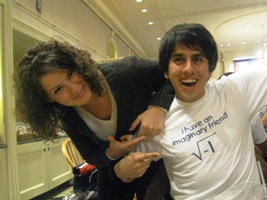Five Sleepless Months at Harvard
Born inTirana in 1987 and currently a 3rd-year student in the Bachelor of International Economics, Management and Finance (BIEM), Livia Themelkois one of the three Bocconi students (along with Dario Manicardi and Vittorio Bassi) who spent an exchange semester at the Harvard Department of Economics, starting last September. "It was the most difficult time of my life, but also the most fun." This is how she describes her five months in the United States today, a few days after getting back.
The Harvard-Bocconi bilateral exchange agreement is now in its second year. "In the area of economics," recalls Fulvio Ortu, Vice Rector and Dean for International Affairs at Bocconi, "Harvard has reciprocal exchange agreements with only three European universities and ours is one of these."
|
|
|
More than just studying |
Not that Livia's afraid of work. She's used to sleeping around four hours a night. In the first two years of the BIEM she held a grade point average of 30.4 while working both at the AIESEC, the student association represented in 100 countries around the world, and at the university as an IT, financial math and microeconomics tutor ("working with students is great," she says). Even at Harvard, with intense study patterns, she worked two hours a day at a student coop store. "My motivation is internal, it's personal," she says. "I can't go to sleep at night if I have any kind of work that hasn't been finished."
"I wasn't sure if I should apply for the exchange," Livia remembers, "because the last year of the BIEM is already difficult, but then I told myself that if I could get into Harvard it would be worth it. And it was. The exchange also supports my desire to explore, to not stay in the same place for more than a few years." Which was the same idea that made her study in Milan in the first place.
With the help of her parents who already spoke Italian, Livia learned the language when she was 5 years-old by watching TV and by 7 she had learned to read and speak it. When it was time to decide where to go to university, she was accepted to various places in Europe and the US, but opted for Bocconi because the BIEM balances economics and management and partly because it's relatively close to home. "I expected Milan to be a more modern city and my first impression of the people was positive," she recalls.
This is similar to what happened in Boston, the US's most European city. "The people and the campus ware even more open than in Milan. Here everyone will help you if you ask, but there they offer to help you. After just a week I had quite a few friends to study and have fun with."
In addition to in-class work, the model of three out of the four courses she took at Harvard required homework of about 15 pages every week. Monday through Thursday Livia went to class until 2:30pm, worked from 3 to 5pm and studied from 6pm to 2am with Friday (no class) and Saturday almost entirely dedicated to homework. "But the weekends were also full of parties, with a lot of different kinds of music that are hard to find in Milan."
"I expected a lot of strange people," continues Livia, "but I actually had a great time. I also learned to worry a lot less. I'm the kind of person that likes to plan everything, even years ahead of time. I've always created a lot of expectations for myself, which can sometimes turn into disappointment. There the environment is different and people are really laid back."
Even relationships with professors are more informal and they're encouraged by the faculty, but in class it's a little too competitive. "The fact is," explains Livia, "that grades are relative. Your grade depends a lot on how well the other students do and what might be good work for one student can be made mediocre by better students."
When she got back from Harvard, Livia was even more certain of continuing her study of economics (the same subject her mother teaches at the University of Tirana) instead of management, and she has more interest in academics than before. She has narrowed down the list of subjects to choose from for her final paper and has a better of idea of which Master of Science to attend and in which sectors she wants to work. Maybe she hasn't completely lost her habit of planning for the future...
